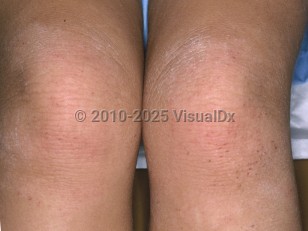Crouzon syndrome in Adult
Alerts and Notices
Important News & Links
Synopsis

Crouzon syndrome is a genetic disorder characterized by craniosynostosis. It is the most common of the craniosynostosis syndromes, with approximately 16 in 1 million newborns diagnosed with the disorder in the United States and 1 in 25 000 worldwide per year. The syndrome is an autosomal dominant disorder in familial cases but also occurs sporadically. The syndrome is caused by the mutation in the fibroblast growth factor receptor-2 gene named FGFR2. This gene codes for a protein that stimulates the growth of bone cells during the development of the embryo. Distinctive malformations of the skull and face are the primary features, including proptosis and relative mandibular prognathism.
Acanthosis nigricans may be present during childhood. Headaches and optic atrophy may result from increased intracranial pressure from hydrocephalus. Convulsions are common. A decrease in mental function occurs in about 15% of patients. Conductive deafness often occurs because of ear canal atresia and stenosis. There may be loss of vision due to exposure keratitis and corneal ulceration secondary to poor lid closure. There may also be an obstruction of the upper airways due to septal deviation, choanal abnormalities, midnasal abnormalities, and nasopharyngeal narrowing.
Acanthosis nigricans may be present during childhood. Headaches and optic atrophy may result from increased intracranial pressure from hydrocephalus. Convulsions are common. A decrease in mental function occurs in about 15% of patients. Conductive deafness often occurs because of ear canal atresia and stenosis. There may be loss of vision due to exposure keratitis and corneal ulceration secondary to poor lid closure. There may also be an obstruction of the upper airways due to septal deviation, choanal abnormalities, midnasal abnormalities, and nasopharyngeal narrowing.
Codes
ICD10CM:
Q75.1 – Craniofacial dysostosis
SNOMEDCT:
28861008 – Crouzon syndrome
Q75.1 – Craniofacial dysostosis
SNOMEDCT:
28861008 – Crouzon syndrome
Look For
Subscription Required
Diagnostic Pearls
Subscription Required
Differential Diagnosis & Pitfalls

To perform a comparison, select diagnoses from the classic differential
Subscription Required
Best Tests
Subscription Required
Management Pearls
Subscription Required
Therapy
Subscription Required
References
Subscription Required
Last Updated:01/12/2022

